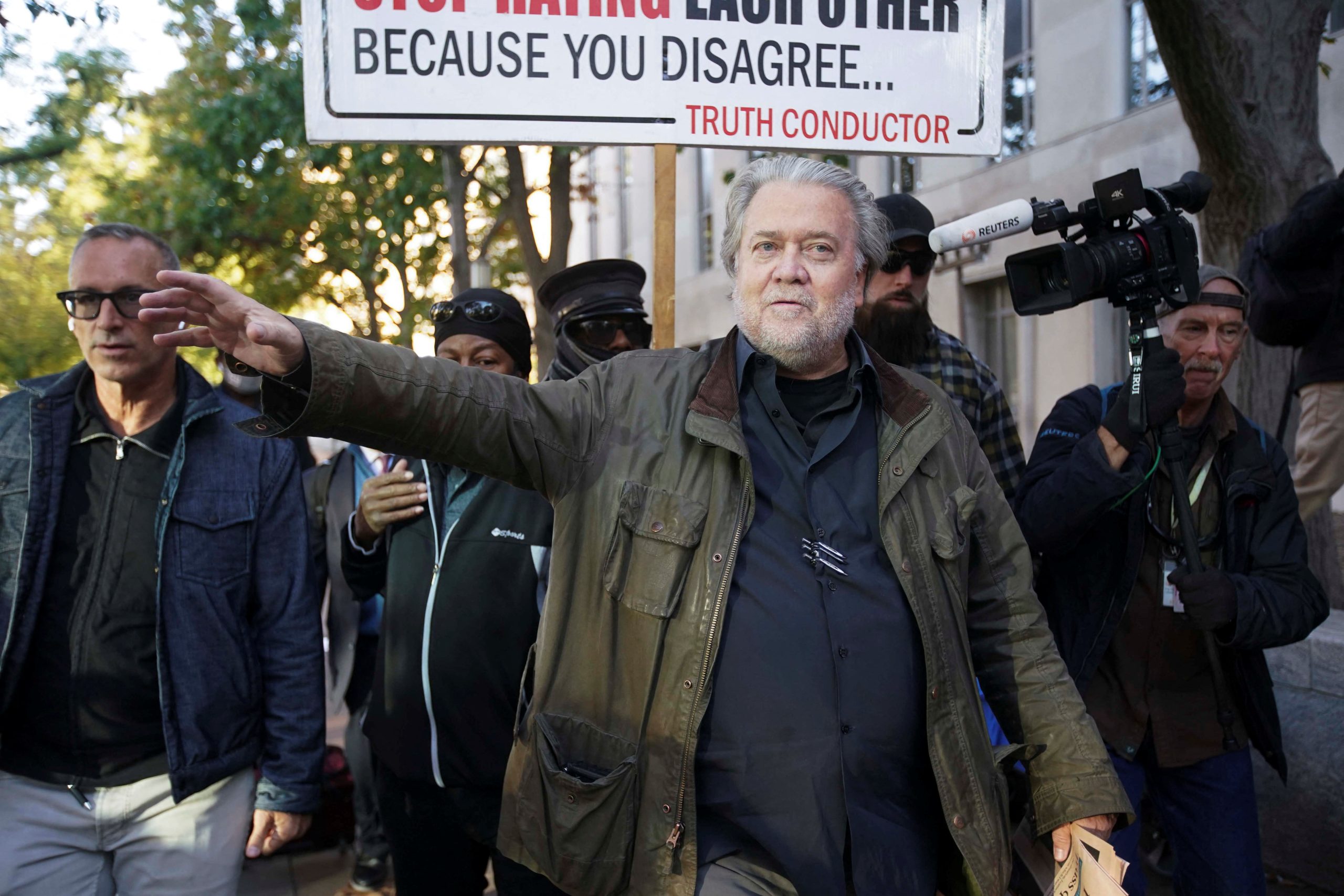
[elfsight_social_share_buttons id=”1″]
Steve Bannon, a one-time adviser to former President Donald Trump, was sentenced by a judge on Friday to four months in prison for refusing to cooperate with lawmakers investigating last year’s U.S. Capitol riot.
Bannon was found guilty in July on two counts of contempt of Congress for failing to provide documents or testimony to the House of Representatives committee investigating the Jan. 6, 2021 attack. Prosecutors had sought a six-month sentence, while Bannon’s attorneys had asked for probation.
U.S. District Judge Carl Nichols also ordered Bannon, a key adviser to the Republican Trump’s 2016 presidential campaign, to pay a fine of $6,500. The judge allowed Bannon to defer serving his sentence while he appeals his conviction.
Prosecutor J.P. Cooney said at Friday’s hearing that Bannon chose to “thumb his nose at Congress.” He “is not above the law, and that’s what makes this case important,” Cooney said.
Bannon, 68, served as Trump’s chief White House strategist in 2017 before a falling out between them that was later patched up.
Bannon declined to address the judge prior to sentencing on Friday.
Outside the courthouse, he delivered fiery remarks as protesters at times tried to drown his voice out with shouts of “Traitor!”
“Today was my judgment day by the judge,” Bannon told reporters. “But … on November 8, they are going to have judgment on the illegitimate Biden regime, and quite frankly, (House Speaker) Nancy Pelosi and the entire committee.”
BANNON: This illegitimate regime, their Judgement Day is on 8 November. When the Biden Administration ends. pic.twitter.com/HB80gfLS9R
— Jack Poso 🇺🇸 (@JackPosobiec) October 21, 2022
Bannon has two weeks to file his appeal, which his lawyers said they intend to do. If he fails to file it on time, he is required to turn himself in by Nov. 15.
According to the Jan. 6 committee, Bannon spoke with Trump at least twice on the day before the attack, attended a planning meeting at a Washington hotel, and said on his podcast that “all hell is going to break loose tomorrow.”
In his trial, prosecutors called only two witnesses while Bannon’s defense team called none. Bannon opted not to testify. Bannon’s lawyers have said they will appeal his conviction.
Bannon’s defense was hamstrung by rulings by Nichols that barred him from asserting that he relied on executive privilege claims and arguing that he relied on advice from his attorney.
The Democratic-led committee has sought testimony from dozens of people in Trump’s orbit. In addition to Bannon, prosecutors have charged former Trump White House adviser Peter Navarro with contempt of Congress for defying a subpoena from the same committee, with a Nov. 17 trial date set. Navarro has pleaded not guilty.
During Friday’s hearing, Bannon’s attorney David Schoen said Bannon relied on the advice of his lawyers not to comply with a congressional subpoena after Trump invoked executive privilege, a legal doctrine that shields some White House communications from disclosure.
“A more egregious contempt of Congress would have been to say ‘Screw you Congress, take your subpoena and shove it!'” Schoen said.
Nichols, in rendering his decision, said he agreed that Bannon should get some credit for relying on legal advice, even if it was “misguided.”
At the same time, Nichols said that Bannon “had not produced a single document” or any testimony to Congress.
“The January 6 Committee has every reason to investigate what happened that day,” Nichols said, adding that “flaunting congressional subpoenas betrays a lack of respect” for Congress.
Friday’s sentencing does not end Bannon’s legal troubles. He was indicted in New York state in September on charges of money laundering and conspiracy, with prosecutors accusing him of deceiving donors into giving money to help build Trump’s promised wall along the U.S.-Mexico border.
Bannon, who pleaded not guilty, could face up to 15 years in prison if convicted on those charges.
Copyright 2022 Thomson/Reuters. Edits for FISM News by Jacob Fuller.
